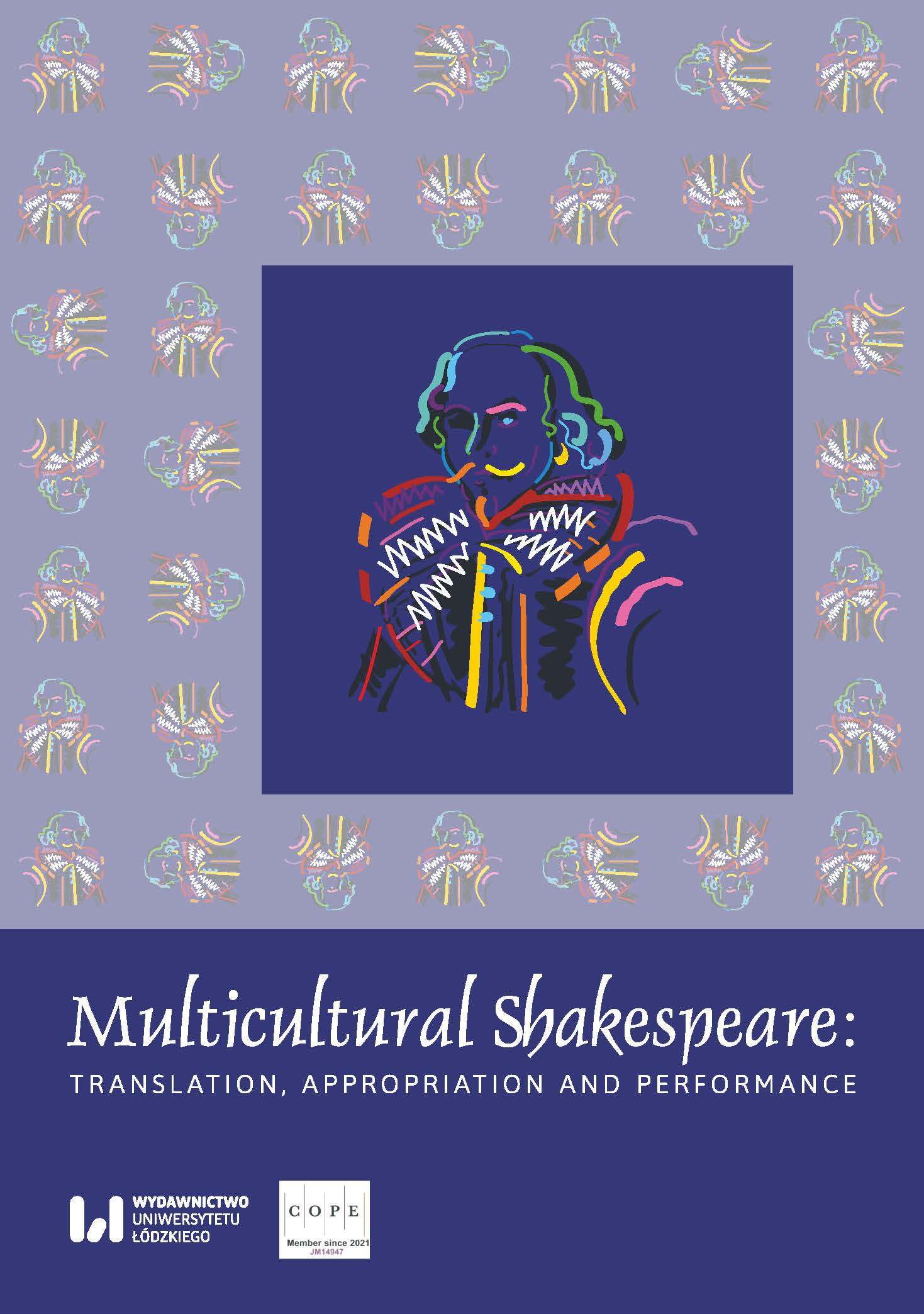Monsters and Marvels: Shakespeare Across Opera, Ballet, Dance, Puppetry, and Music in Central and Eastern Europe—and Beyond
DOI:
https://doi.org/10.18778/2083-8530.28.05Keywords:
William Shakespeare, dance theatre, opera, ballet, musical, puppetry, transmedialityAbstract
This collectively authored position paper discusses “hybrid” Shakespeares in Central and Eastern Europe, focusing on productions that offer formal experimentation and transnational perspectives. While their contexts remain regional, they provide an insight into how Shakspeare has been mobilised regionally. The paper consists of four distinct parts, each considering Shakespeare in a hybrid form: in opera, dance and musical theatre as well as puppetry in the transnational, regional context. The general discussions of Shakespeare’s presence/appropriation in these art forms are followed by case studies that illustrate the significance of hybridity that characterises Shakespeare in the Central and Eastern European transnational context. Our brief analyses and selected case studies suggest a need for a detailed study of Shakespeare and performative arts in Central and Eastern Europe that would concentrate on the transgressive impulse these theatrical blends realised through formal experiment and artistic innovation.
The publication of the article was supported by the International Visegrad Fund, project no. 22210007, titled “Crossing Borders with Shakespeare since 1945: Central and Eastern European Roots and Routes.” The project is co-financed by the Governments of the Czechia, Hungary, Poland and Slovakia through Visegrad Grants. The mission of the Fund is to advance ideas for sustainable regional cooperation in Central Europe.
Downloads
References
Balogh, Géza. “Cseh-szlovák-magyar kapcsolatok a magyar bábművészetben.” [Czech-Slovak-Hungarian Relations in Hungarian Puppetry]. Art Limes 1 (2018): 20-31.
Google Scholar
Banaś, Monika. “Women’s ‘Black Protest’ in Poland: Symbolism and Performance as (un) effective Negotiation in Political Discourse.” Protest in Late Modern Societies. Eds. Monika Banaś, Ruslan Saduov. New York and London: Routledge, 2023. 117-131.
Google Scholar
DOI: https://doi.org/10.4324/9781003270065-9
Billing, Christian M. and Pavel Drábek. “Czech Puppet Theatre in Global Contexts: Roots, Theories and Encounters.” Theatralia. Czech Puppet Theatre in Global Contexts: Roots, Theories and Encounters 18 (2015): 2: 5-31.
Google Scholar
DOI: https://doi.org/10.5817/TY2015-2-1
Bottez, Alina. “Graham Vick’s production.” Received by Gabriella Reuss. 18 June 2023.
Google Scholar
Dempster, Elizabeth. “Women Writing the Body: Let’s Watch a Little How She Dances.” The Routledge Dance Studies Reader. Ed. A. Carter, Routledge, London and New York: Routledge, 2010. 229-235.
Google Scholar
Henke, Robert, and Eric Nicholson. “Introduction.” Transnational mobilities in early modern theatre. Eds. Robert Henke and Eric Nicholson. Ashgate Publishing, Ltd., 2014.
Google Scholar
Hutcheon, Linda. A Theory of Adaptation. Abingdon and New York: Routledge, 2006.
Google Scholar
DOI: https://doi.org/10.4324/9780203957721
Golonka, Marek. Polski megamusical?: teatr Wojciecha Kościelniaka a światowy teatr musicalowy. [Polish megamusical? Wojciech Koscielniak’s theatre and the world’s musical theatre] Warsaw: Wydawnictwa Uniwersytetu Warszawskiego, 2023.
Google Scholar
DOI: https://doi.org/10.31338/uw.9788323559382
Grabowska, Jadwiga, and Joanna Szymajda, Raport o tańcu współczesnym w Polsce w latach 1989-2009. [Report on Contemporary Dance in Poland between 1989-2009] Report commissioned by the Polish Ministry of Culture and National Heritage, Kraków-Łódź, April 2009.] https://www.e-sgh.pl/lms/content/9350109/taniec_raport_w_pelna.pdf https://www.e-sgh.pl/lms/content/9350109/taniec_raport_w_pelna.pdf Accessed 6 August 2023.
Google Scholar
Gyárfás, Orsolya. “All Good Fun: A Flesh-and-Blood Falstaff at Müpa Budapest.” BachTrack, 08 March 2018. https://bachtrack.com/review-falstaff-ivan-fischer-budapest-festival-orchestra-mupa-march-2018 Accessed 18 June 2023.
Google Scholar
Klaić, Dragan. Resetting the Stage: Public Theatre between the Market and Democracy. Bristol/Chicago: Intellect, 2012.
Google Scholar
DOI: https://doi.org/10.2307/j.ctv9hj78n
Klein, Gabriele. “Transnationale und Postkoloniale Tanzkulturen.” Globale Jugend und Jugendkulturen: Aufwachsen im Zeitalter der Globalisierung. Eds. Dirk Villányi, Matthias D. Witte and Uwe Sander. Gelsenkirchen: Beltz Juventa, 2007. 283-298.
Google Scholar
Kobialka, Michal. ”Introduction.” Of Borders and Thresholds: Theatre History, Practice, and Theory. Ed. Michal Kobialka, Minneapolis, MN: Minnesota University Press, 1999. 1-29.
Google Scholar
Limon, Jerzy and Agnieszka Żukowska. “Introduction.” Theatrical Blends: Art in the Theatre, Theatre in the Arts. Ed. Jerzy Limon and Agnieszka Żukowska. Gdańsk: Theatrum Gedanense Foundation, 2010.
Google Scholar
Malíková, Nina. “Josef Krofta.” UNIMA. 2015. https://wepa.unima.org/en/josef-krofta/ Accessed 28 November 2023.
Google Scholar
Mikołajczyk, Jacek. Musical nad Wisłą: historia musicalu w Polsce w latach 1957-1989. [Musical by the Vistula River: History of Musical in Poland 1957-1989]. Gliwice: Gliwicki Teatr Muzyczny, 2010.
Google Scholar
Mikule, Martin. “Czech musical Hamlet Aims to Conquer Broadway.” Radio Prague International, 08/12/2005. https://english.radio.cz/czech-musical-hamlet-aims-conquer-broadway-8628802 Accessed 28 November 2023.
Google Scholar
Nyczek, T. “Will Szekspir Superstar.” Przekrój 14.09.2010, issue 37, http://www.eteatr.pl/pl/artykuly/102307/druk.html Accessed 14 August 2023.
Google Scholar
Pitak-Piaskowska, Barbara. “Brush up your Shakespeare! O szekspirowskich inspi-racjach w amerykańskim musicalu teatralnym i filmowym (na wybranych przy-kładach).” [“Brush up your Shakespeare! On Shakespearean Inspirations in American Theatrical and Film Musical (On selected Examples)].” Konteksty Kultury 4 (2014): 421-434.
Google Scholar
Reuss, Gabriella. “Shakespeare in the Post-1989 Hungarian Puppet Scene.” Theatralia 24 (2021): 151-170. https://doi.org/10.5817/TY2021-S-9
Google Scholar
DOI: https://doi.org/10.5817/TY2021-S-9
Romanowska, Agnieszka. “Shakespeare, Thou Art Translated. A Midsummer Night’s Dream as Rock-opera.” Studia Litteraria Universitatis Iagellonicae Cracoviensis 3 (2018): 205-218.
Google Scholar
DOI: https://doi.org/10.4467/20843933ST.18.019.8962
Rozett, Martha Tuck. Talking Back to Shakespeare. London and Toronto: Associated UP, 1994.
Google Scholar
Sokolova, Boika. “Mingled Yarn: The Merchant of Venice East of Berlin and the Legacy of Eastern Europe.” Shakespeare Survey 71 (2018): 88-102.
Google Scholar
DOI: https://doi.org/10.1017/9781108557177.012
Shapiro, Sherry Badger. “Dance as Activism: The Power to Envision, Move and Change.” Dance Research Aotearoa 4 (2016): 3-33.
Google Scholar
DOI: https://doi.org/10.15663/dra.v4i1.53
Truksová, Barbora. “Pilsen Taming of the Shrew is a Dance Triumph.” 17 November 2017. https://alenapeskova.cz/en/plzenske-zkroceni-zle-zeny-je-tanecnim-triumfem Accessed 29 November 2023.
Google Scholar
Teague, Fran. “Shakespeare and Musical Theatre.” The Edinburgh Companion to Shakespeare and the Arts. Eds. Mark Thornton Burnett, Adrian Streete and Ramona Wray. Edinburgh University Press: Edinburgh, 2011. 185-199. https://doi.org/10.1515/9780748635245-014
Google Scholar
DOI: https://doi.org/10.3366/edinburgh/9780748635238.003.0011
Tomaszewska, Ewa. “A Midsummer Night’s Dream in Polish puppet theatres in Silesia – Mise-en-Scène by Jan Dorman, Josef Krofta and Marián Pecko.” Theatralia 21.2 (2018): 95-111. https://doi.org/10.5817/TY2018-2-7
Google Scholar
DOI: https://doi.org/10.5817/TY2018-2-7
Waszkiel, Marek. Dzieje teatru lalek w Polsce 1944-2000. [History of Puppet Theatre in Poland 1944-2000]. Warsaw: Akademia Teatralna im. Aleksandra Zelwerowicza w Warszawie, 2012.
Google Scholar
Downloads
Published
How to Cite
Issue
Section
License

This work is licensed under a Creative Commons Attribution-NonCommercial-NoDerivatives 4.0 International License.
Funding data
-
International Visegrad Fund
Grant numbers Project no. 22210007, titled “Crossing Borders with Shakespeare since 1945: Central and Eastern European Roots and Routes.”












